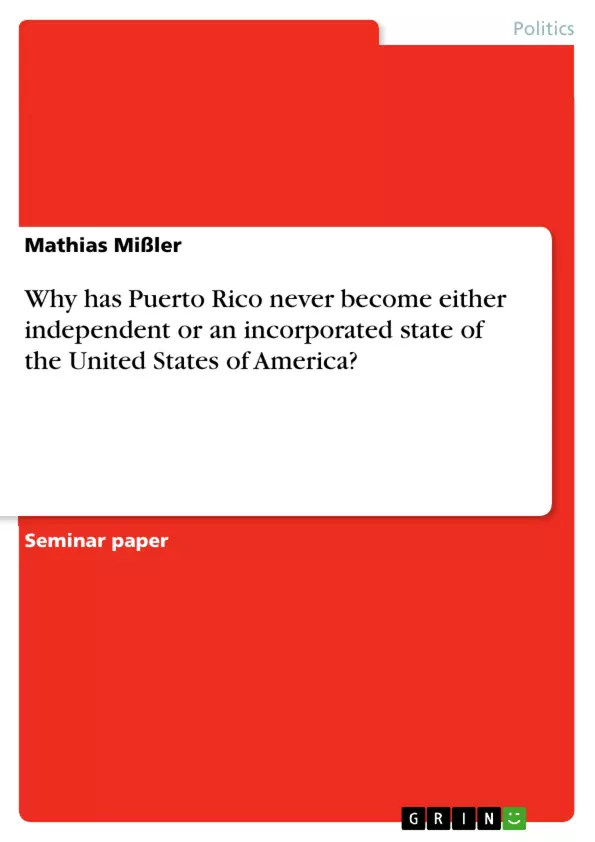The research question of this work is "Why has Puerto Rico never become either independent or an incorporated state of the United States of America?" and focuses on making visible the reasons for the absence of a decision for a clear status of the Commonwealth of Puerto Rico.
The first part of the paper will briefly outline the history of the Caribbean island before the main part will examine historical speeches, documents, status referenda, special events and monographs concerning Puerto Rico and the reasons for the lack of incorporation or independence from both the Puerto Rican and the United States point of view. One of the main points of interest will be to uncover possible racism as a motive for the USA to keep the colony in possession, since it has always been prevalent in the pejorative treatment of non-white minorities. In addition, it will be clarified why the inhabitants of Puerto Rico have long supported or endured the unclear status of the Commonwealth.
Inhaltsverzeichnis (Table of Contents)
- Introduction
- Historical Background
- Analysis of historical sources in search of reasons...
- General Miles 1898
- William McKinley 1899
- Downes vs. Bidwell 1901
- Theodore Roosevelt 1906
- Post World War II and The Establishment of the Commonwealth 1953
- John F. Kennedy 1958/ Gerald R. Ford 1977/ Ronald Reagan 1982/ George Bush senior 1989
- Referenda 1993, 1998, 2012 and 2017
- Recent past
- Conclusion
Zielsetzung und Themenschwerpunkte (Objectives and Key Themes)
This work aims to analyze the historical and political factors that have prevented Puerto Rico from attaining either independence or becoming an incorporated state of the United States of America. It examines the motivations behind the continued ambiguous status of the Commonwealth of Puerto Rico from both the Puerto Rican and the US perspectives.
- The historical development of Puerto Rico's relationship with the United States since the Spanish-American War.
- The role of racism in shaping US policies towards Puerto Rico.
- The impact of US economic and political interests on Puerto Rico's status.
- The perspectives of the Puerto Rican people on their political status.
- The international context surrounding Puerto Rico's situation, including decolonization movements and the UN's decolonization committee.
Zusammenfassung der Kapitel (Chapter Summaries)
The introduction outlines the current economic and political challenges facing Puerto Rico, highlighting the controversial status of the Commonwealth. It introduces the research question: "Why has Puerto Rico never become either independent or an incorporated state of the United States of America?"
The chapter on historical background provides a brief overview of Puerto Rico's history, focusing on the island's transition from Spanish rule to US control during the Spanish-American War. It describes the evolution of Puerto Rico's political status from a militarily governed colony to a Commonwealth in 1952.
The following chapter, "Analysis of historical sources in search of reasons...", delves into a chronological examination of historical speeches, documents, status referenda, and other relevant sources. It analyzes these materials to identify potential reasons for the lack of incorporation or independence for Puerto Rico. This analysis includes an investigation into the potential role of racism in shaping US policies.
Schlüsselwörter (Keywords)
Puerto Rico, Commonwealth, independence, statehood, decolonization, racism, US colonialism, economic development, political status, referenda, historical analysis, primary sources, US-Puerto Rican relations.
Frequently Asked Questions
Why hasn't Puerto Rico become independent or a US state?
The status remains ambiguous due to a complex mix of US economic interests, political disagreements within Puerto Rico, and historical factors dating back to the Spanish-American War.
What role did racism play in US policy toward Puerto Rico?
Historical analysis suggests that the pejorative treatment of non-white minorities influenced the US decision to keep Puerto Rico as a colony rather than incorporating it as a full state.
When did Puerto Rico become a Commonwealth?
The Commonwealth of Puerto Rico was established in 1952, providing a middle ground between independence and statehood.
What have the recent referenda shown about Puerto Rican sentiment?
Referenda in 1993, 1998, 2012, and 2017 have shown divided opinions, though recent votes have indicated a growing preference for statehood, despite low turnout or boycotts.
What was the significance of the "Downes vs. Bidwell" case in 1901?
This Supreme Court case was part of the "Insular Cases" which determined that the US Constitution does not automatically apply to unincorporated territories.
How do US economic interests affect Puerto Rico's status?
The US has historically benefited from Puerto Rico as a strategic military location and a captive market, which has influenced the lack of a clear decision on its independence.
- Quote paper
- Mathias Mißler (Author), 2020, Why has Puerto Rico never become either independent or an incorporated state of the United States of America?, Munich, GRIN Verlag, https://www.grin.com/document/932836



